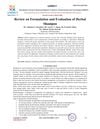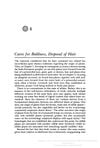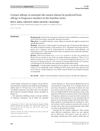 68 citations,
April 2002 in “Journal of Alternative and Complementary Medicine”
68 citations,
April 2002 in “Journal of Alternative and Complementary Medicine” Natural 5AR inhibitors effectively improve mild to moderate hair loss in men.
 67 citations,
February 2015 in “Life Sciences”
67 citations,
February 2015 in “Life Sciences” Some plant-based treatments can help with benign prostatic hyperplasia symptoms, but more research is needed to confirm their safety and effectiveness.
[object Object]  9 citations,
February 2011 in “Revista Brasileira de Farmacognosia”
9 citations,
February 2011 in “Revista Brasileira de Farmacognosia” Tridax procumbens plant parts boost immune response in mice.
 January 2009 in “Elsevier eBooks”
January 2009 in “Elsevier eBooks” Some plant-based treatments may help with ovary function, insulin resistance, and excess male hormones in PCOS, but more research is needed to confirm their safety and effectiveness.
 65 citations,
April 2002 in “Journal of Alternative and Complementary Medicine”
65 citations,
April 2002 in “Journal of Alternative and Complementary Medicine” Plant extracts effectively reduce hair loss and increase growth, offering a safe alternative treatment.
 43 citations,
February 2020 in “Clinica chimica acta”
43 citations,
February 2020 in “Clinica chimica acta” Nano-sized plant-based chemicals could improve cervical cancer treatment by being more effective and causing fewer side effects than current methods.
 April 2024 in “Pharmacognosy research”
April 2024 in “Pharmacognosy research” The herbal hair dye with natural ingredients like henna was successfully made and tested, but more research is needed on its effectiveness on different hair colors and benefits.
 February 2024 in “International journal of biology, pharmacy and allied sciences”
February 2024 in “International journal of biology, pharmacy and allied sciences” Plant-based treatments can effectively and safely treat hair loss.
[object Object]  January 2020 in “Elsevier eBooks”
January 2020 in “Elsevier eBooks” Plant-based chemicals may help hair growth and prevent hair loss but need more research to compete with current treatments.
 June 2014 in “Basic & Clinical Pharmacology & Toxicology”
June 2014 in “Basic & Clinical Pharmacology & Toxicology” Some plant extracts may treat livestock diseases, certain animal treatments are safe and effective, but more research on drug safety and resistance is needed.
 October 2001 in “WORLD SCIENTIFIC eBooks”
October 2001 in “WORLD SCIENTIFIC eBooks” Many substances, including chemicals and metals, can cause skin reactions; careful handling and identification of allergens are crucial to prevent dermatitis.
 15 citations,
October 2016 in “Steroids”
15 citations,
October 2016 in “Steroids” Researchers developed a new method to find substances in herbs that can block a specific enzyme linked to hair loss.
 1 citations,
December 2023 in “Annals of Phytomedicine An International Journal”
1 citations,
December 2023 in “Annals of Phytomedicine An International Journal” Nanoemulgel improves delivery and effectiveness of plant-based drugs for various conditions.
 November 2023 in “International Journal For Multidisciplinary Research”
November 2023 in “International Journal For Multidisciplinary Research” Herbal hair oil made with natural ingredients helps reduce hair loss, dandruff, and graying.

Plant roots respond to fungus smells by possibly using certain proteins and a plant hormone to change root growth, but more research is needed.
 130 citations,
January 2017 in “International journal of nanomedicine”
130 citations,
January 2017 in “International journal of nanomedicine” Silver nanoparticles coated with substances like PEG showed strong antibacterial effects and improved wound healing when used in hydrogels.
 125 citations,
December 2016 in “Molecules”
125 citations,
December 2016 in “Molecules” Substances from Chinese medicines show promise for immune support and disease prevention, but the way they are processed affects their effectiveness.
 8 citations,
April 2019 in “International journal of scientific research in biological science”
8 citations,
April 2019 in “International journal of scientific research in biological science” Tridax procumbens is a widely used medicinal plant with many health benefits.
 4 citations,
September 2020 in “BioMed Research International”
4 citations,
September 2020 in “BioMed Research International” Timosaponin BII, a plant extract, was found to promote hair growth in mice, similarly to minoxidil.
 March 2024 in “International Journal of Advanced Research in Science, Communication and Technology”
March 2024 in “International Journal of Advanced Research in Science, Communication and Technology” Herbal shampoos with plant-based ingredients can effectively promote hair growth, treat dandruff, and add shine.
 June 2023 in “International journal of pharmaceutical quality assurance”
June 2023 in “International journal of pharmaceutical quality assurance” Eclipta alba extract could be a promising natural treatment for hair loss.

Marking Nut extract in coconut oil may be an effective natural alternative for treating dandruff and promoting hair growth.
 January 2021 in “Middle East journal of applied sciences”
January 2021 in “Middle East journal of applied sciences” Zinc is essential for plant growth and human health, but many soils lack enough zinc, affecting crops and potentially leading to health problems.
 8 citations,
December 2011 in “Journal of Medicinal Food”
8 citations,
December 2011 in “Journal of Medicinal Food” D-004 may be a natural alternative to finasteride for treating enlarged prostate and male baldness.
 29 citations,
May 1998 in “Bulletin of the American College of Nurse-Midwifery”
29 citations,
May 1998 in “Bulletin of the American College of Nurse-Midwifery” The document concludes that menopause should be seen as a natural part of aging and managed with personalized care and informed choices.
 7 citations,
September 2014 in “Beni-Suef University Journal of Basic and Applied Sciences”
7 citations,
September 2014 in “Beni-Suef University Journal of Basic and Applied Sciences” Cuscuta reflexa extracts and an isolate promoted hair growth and could be natural treatments for hair loss.

Bee pollen, green tea, essential oils, and various plant extracts improve skin and hair health.
 February 2014 in “Harvard University Press eBooks”
February 2014 in “Harvard University Press eBooks” The document describes how hair and plants are symbolically linked in Indo-European traditions, leading to practices like burying hair to promote plant growth and using plants to treat baldness.
 July 2011 in “Springer eBooks”
July 2011 in “Springer eBooks” The document concluded that FDA-approved treatments like minoxidil and finasteride are effective for hair loss, while the effectiveness of natural remedies and other non-approved treatments is not well-supported by evidence.
 23 citations,
January 2016 in “Contact Dermatitis”
23 citations,
January 2016 in “Contact Dermatitis” Allergies to some essential oils may not be found with standard fragrance tests.





























